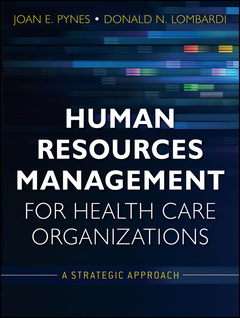Human Resources Management for Health Care Organizations A Strategic Approach
Auteurs : Pynes Joan E., Lombardi Donald N.

Preface xv
The Authors xxi
Part One Human Resources Management in the Health Care Business Arena 1
Chapter 1: Introduction to Health Care Human Resources Management 3
Defining Elements of Progressive Health Care Organizations 4
Current Perceptions of Health Care Organizations 7
Spheres of Influence Model 9
Five Significant Change Dynamics of Modern Health Care 12
Profile of a Progressive Health Care Organization 21
Composition of a Progressive Health Care Human Resources Management Department 26
Chapter 2: Strategic Health Care Human Resources Management and Planning 31
The Changing Role of Human Resources Management 32
Human Resources Outsourcing 35
Strategic Human Resources Management and Human Resources Planning 36
Anticipating Future Needs 38
Evaluating the Effectiveness of Strategic Human Resources Management 42
Problems and Implications of Strategic Human Resources Management 44
Chapter 3: Organizational Culture Standards for Health Care Human Resources 49
Performance Matrix of Superstars, Steadies, and Nonplayers 50
PACT Formula 54
Strategic Requirements for a Progressive Health Care Human Resources Management Department 74
Chapter 4: Equal Employment Opportunity Laws and Health Care Human Resources Management 83
Federal Equal Employment Opportunity Laws 84
Proving Employment Discrimination 96
Affirmative Action: Executive Orders and Other Federal Laws 98
Constitutional Rights 102
Additional Protections for Employees 109
Chapter 5: Managing the Unique Health Care Workforce 115
Cultural Factors Relevant to Health Care Human Resources 122
Practical Application: A Tale of Two Jersey Cultures 129
Chapter 6: The Importance of Volunteers in Health Care Organizations 135
Selection and Placement Strategy Considerations for Volunteers 136
Maximizing Health Care Volunteer Performance 143
Agenda Topics for Volunteer Summits 148
Ten Essential Rules for Volunteer Placement 150
Part Two Methods and Accountabilities of Health Care Human Resources 153
Chapter 7: Critical Job Analysis and Design 155
Legal Significance of Job Analysis 157
Job Analysis Information 158
Designing a Job Analysis Program 163
Job Descriptions and Job Specifications 164
Competency Modeling 168
Job Analysis Techniques 171
Chapter 8: Recruitment, Interviewing, and Selection Strategies 177
Preselection Process 178
Critical Dimensions of External Recruitment 195
Preparing and Planning for the Interview 198
Conducting the Interview 199
Evaluating the Interview 204
Chapter 9: Maximizing Performance Management and Evaluation 209
Developing an Evaluation Program 210
Using Defusers—the Return to Objectivity Formula 241
Chapter 10: Compensation Strategies 247
Motivation 248
Equity 253
Executive Compensation and Benefits 265
Federal Laws Governing Compensation 267
Chapter 11: Benefits 271
Government Required Benefits 272
Discretionary Benefits 276
Quality-of-Work and Quality-of-Life Issues 282
Part Three Maximizing Health Care Human Resources 287
Chapter 12: Training and Development 289
Needs Assessment 291
Developing Training Objectives 293
Developing the Curriculum 294
Delivering Training 302
Evaluating Training 303
Career Development 306
Health Care Training and Development in Application 308
Relevant and Resonant Health Care Organizational Training and Development 310
Chapter 13: Organizational Development Strategies 319
Essential Objectives of Health Care Organizational Development 319
Organizational Development Strategies for Building Pride 329
Organizational Development Strategies for Escalating Accountability 338
Organizational Development Strategies for Team Building 344
Chapter 14: Labor-Management Relations 353
Collective Bargaining in the Private Sector 354
Collective Bargaining in Health Care Organizations 355
Collective Bargaining in Federal Government Agencies 358
Collective Bargaining in State and Local Government Agencies 359
Concepts and Practices of Collective Bargaining 360
Chapter 15: Strategic Health Care Human Resources Technology 377
Information Systems Technology 379
Organizational Change 380
Types of Information Systems 381
Human Resources Information Systems 384
Bibliography 393
Index 409
Joan E. Pynes is Professor of Public Administration in the Department of Government and International Affairs at the University of South Florida. She received her bachelor's degree in public justice from SUNY Oswego and her PhD in public administration from Florida Atlantic University. She is the author or co-author of five books, most recently Effective Nonprofit Management: Context and Environment and Human Resources Management for Public and Nonprofit Organizations: A Strategic Approach, Third Edition. She has written or co-written more than fifty academic articles, book chapters, technical reports, and encyclopedia entries about public and nonprofit human resources management.
Donald N. Lombardi is Industry Professor of Healthcare, director of the Stevens Healthcare Educational Partnership, and academic director of the Veterans Office at Stevens Institute of Technology in Hoboken, New Jersey. He has consulted to more than 170 health care organizations in all 50 states and ten foreign countries, has developed seven accreditation programs for the American College of Healthcare Executives since 1986, and has written eleven books, including Handbook for the New Health Care Manager. Dr. Lombardi holds more than fifty U.S. copyrights on organizational planning, management, and development systems for text, on-site, and on-line delivery.
Date de parution : 01-2012
Ouvrage de 448 p.
17.3x23.1 cm
Thème de Human Resources Management for Health Care Organizations :
Mots-clés :
health services human resource management, human resource management in public health settings, work in health services, workplace assessment in health services, motivators in health services, HR planning for health services, recruitment in health services decentralization in health services, criteria-based position descriptions in health services, performance appraisals in health services, career ladder development in health services, incentives in health services, improve retention in health services, regulatory issues in health services, accreditation issues in health services


